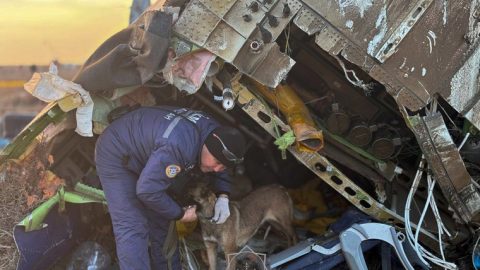
HONG KONG — Evergrande Group built a real estate empire on a mountain of debt. Now the Chinese property giant is in trouble — and there are fears it might take the global economy down with it.
The uncertainty fueled a market sell-off this week and has raised concerns of a crisis similar to the one set off in 2008 by the collapse of the U.S. investment bank Lehman Brothers. Experts say such comparisons are overblown, not least because the Chinese government exerts a much greater degree of control over even private companies like Evergrande.
But the developer’s predicament could deal a serious blow to the world’s second-biggest economy as Beijing faces what may be one of its largest defaults.
‘Ponzi-like’
The cash-strapped Evergrande has sold millions of apartments to China’s growing middle class since being founded in 1996 by billionaire Xu Jiayin, 62, once China’s richest man. The company, based in the southern hub Shenzhen, says it has more than 200,000 employees, as well as some 1,300 projects in more than 280 Chinese cities.
For years, the model worked.
Evergrande built property, sold it long before completion to Chinese customers eager for either a new home or a safe place to invest their growing income, and the company then used the money to build more.
With the real estate business booming, it even branched out into theme parks, bottled water and soccer ownership.
Download the NBC News app for breaking news and politics
It also amassed $300 billion in debt, equivalent to about 2 percent of China’s gross domestic product, making it the world’s most indebted developer. Now a slowing property market and the ruling Communist Party’s efforts to remake the Chinese economy have forced a reckoning with Evergrande’s issues.
Sales are down. Construction on some projects has been halted over delayed payments. And the company’s offices in China have been besieged for weeks by angry protesters, many of them employees, who worry they may not recover their investments in Evergrande properties and financial products.
Beijing is reportedly asking local officials to prepare for the fallout from a total collapse.
Some view the turmoil as a necessary check on China’s overheated real estate industry.
“As the property sector got out of control, it was very difficult to clamp it down, because it was such an important source of growth,” Michael Pettis, a professor of finance at Peking University in Beijing, said in an interview with NBC News on Thursday. “Perhaps now we’re starting to see the beginning of a long and very difficult process of making the property sector a more normal part of the economy.”
The property sector has been central to China’s explosive growth in recent years, accounting for an estimated quarter of the GDP in a country in which high-saving households have few other safe places to invest — almost 70 percent of the Chinese household wealth is held in real estate.
But developers like Evergrande — confident that Beijing would prop them up if necessary — have become overextended, raising funds to cover current debt obligations in a “Ponzi-like manner,” Sara Hsu, a U.S.-based visiting scholar at China’s Fudan University who specializes in Chinese economic development, said in an email.
Evergrande has been trying to cut its debt for several years, and Chinese officials have long had their eye on it as a potential systemic risk. The company narrowly avoided a $13 billion cash crunch last year. This month, it again warned of a default as it scrambles to raise the money it needs to pay lenders and suppliers.
It has tried to raise cash by slashing property prices and offloading other businesses it has expanded into, including an electric vehicle unit that has yet to sell a single car. Some investors have been offered real estate in lieu of cash repayment. In a letter to employees that was greeted with skepticism, Xu vowed this week that his company would “walk out of the darkness soon.”
Evergrande did not respond to a request for comment.
‘The game has changed’
Though the Chinese government has bailed out other “too big to fail” companies in the past, its strategy is shifting.
That is reflected in Chinese leader Xi Jinping’s “common prosperity” campaign to address the country’s wealth gap, which includes everything from affordable housing to curbs on children playing video games. Xi has also expressed a desire for economic expansion to be driven more by “high-quality” growth such as consumption and exports and less by empty apartments.
Last year, Chinese regulators introduced three “red lines” aimed at forcing real estate developers to improve their financial health.
Experts point out that if Evergrande is to collapse, it’s because the Chinese government is allowing it to. The challenge for Xi is how to reduce industry debt and rein in runaway housing prices, while also protecting China’s wider economy.
Analysts have already cut the country’s growth forecast for the year and investors will be concerned that the Evergrande crisis may not be an isolated event.
“It’s just a bloated sector,” Alicia Garcia-Herrero, chief Asia-Pacific economist at Natixis in Hong Kong, said in a phone interview Thursday. “It needs to shrink, but by shrinking China’s growth rate will obviously suffer, there’s no doubt about it.”
The growing consensus is that while Beijing may not bail out Evergrande itself, it will move to protect homebuyers, as well as smaller banks that could be destabilized by a default. Foreign investors are more likely to be left out in the cold.
“They’re not going to step in and guarantee everything because they’ve been trying to wring out of the system this addiction to debt and the speculation on property,” Pettis said. “But on the other hand, they can’t allow everything to collapse because this could spread very rapidly.”
U.S. officials have played down the risk that Evergrande poses to global markets. Federal Reserve Chair Jerome Powell said the company’s debt crisis “seems very particular to China.”
“There’s not a lot of direct United States exposure, the big Chinese banks are not tremendously exposed,” he told reporters Wednesday after the Fed’s two-day policy meeting. “But you would worry that it would affect global financial conditions through confidence channels and that kind of thing.”
Hsu also said that while Evergrande is likely to default on its offshore bonds in the coming weeks, the impact on the U.S. economy would be minimal.
For China, what happens next is not a series of defaults among its large developers, “but those developers are going to behave much better,” Garcia-Herrero said.
“The game has changed and they need to realize that.”









Recent Comments